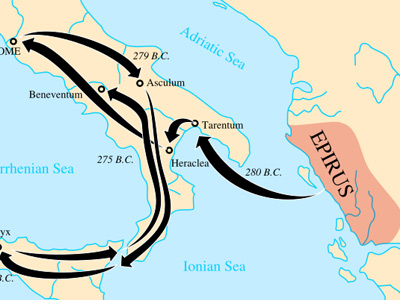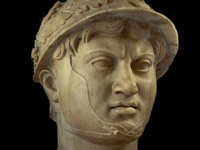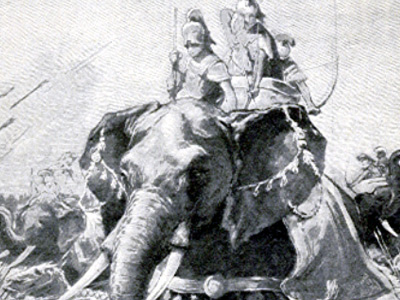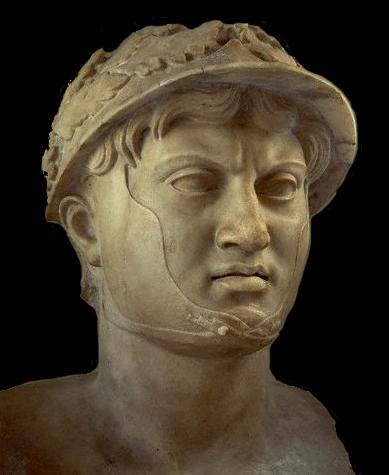Pyrrhic War (280–275 BC)

Background
By 290 BC, at the end of the three Samnite Wars, Rome had established her hegemony over parts of central and southern Italy, which was cemented through alliances with various Italic peoples in central Italy (the Marsi, Vestini, Marruccini, Paeligni and Frentani and Picentes) and the Samnites, Lucanians and some cities in northern Apulia in the south. Rome had become the dominant power. Rome's concerns were still restricted to Italy and she had never been involved in the larger international affairs of the Mediterranean, nor pitted its military strength against any of the Hellenistic states in the eastern Mediterranean. Pyrrhus' intervention in Italy led to Rome's first confrontation with one of these states. To the south of the Roman The Roman Republic was a form of government of Rome and the era of the classical Roman civilization when it was run through public representation of the Roman people. Beginning with the overthrow of the Roman Kingdom (traditionally dated to 509 BC) and ending in 27 BC with the establishment of the Roman Empire, Rome's control rapidly expanded during this period - from the city's immediate surroundings to hegemony over the entire Mediterranean world. sphere of influence in Italy there was number of Greek city-states which had been founded by Greek settlers from the 8th to the 6th century BC in Italy (primarily on the coasts of Calabria and Basilicata and in eastern and southern Sicily). Tarentum was the largest and most powerful Greek city in Italy. Tarentum asked Pyrrhus to go to Italy to assist them because Rome declared war on the city. This followed Tarentum attacking a Roman fleet off their coast, sinking some of their ships and capturing some prisoners. The Tarentines rejected Rome's diplomatic proposals to resolve the situation and ridiculed the Roman envoys, leading Rome to declare war. The Tarentines were probably concerned about Rome's growing influence over the Greek cities in southern Italy. There are different versions of the events which led to the declaration of war. Appian and Cassius Dio and Zonaras appear to be intent on blaming the war on the Tarentum. The part of the text of Dionysius of Halicarnassus which deals with the events in the run-up to the declaration war has been lost and Plutarch did mention them.
The Roman Republic was a form of government of Rome and the era of the classical Roman civilization when it was run through public representation of the Roman people. Beginning with the overthrow of the Roman Kingdom (traditionally dated to 509 BC) and ending in 27 BC with the establishment of the Roman Empire, Rome's control rapidly expanded during this period - from the city's immediate surroundings to hegemony over the entire Mediterranean world. sphere of influence in Italy there was number of Greek city-states which had been founded by Greek settlers from the 8th to the 6th century BC in Italy (primarily on the coasts of Calabria and Basilicata and in eastern and southern Sicily). Tarentum was the largest and most powerful Greek city in Italy. Tarentum asked Pyrrhus to go to Italy to assist them because Rome declared war on the city. This followed Tarentum attacking a Roman fleet off their coast, sinking some of their ships and capturing some prisoners. The Tarentines rejected Rome's diplomatic proposals to resolve the situation and ridiculed the Roman envoys, leading Rome to declare war. The Tarentines were probably concerned about Rome's growing influence over the Greek cities in southern Italy. There are different versions of the events which led to the declaration of war. Appian and Cassius Dio and Zonaras appear to be intent on blaming the war on the Tarentum. The part of the text of Dionysius of Halicarnassus which deals with the events in the run-up to the declaration war has been lost and Plutarch did mention them.
In Appian's version, in 282 BC ten Roman ships appeared close to Tarentum, which was in the north-eastern part of the Gulf of Taranto. According to Appian, Publius Cornelius Dolabella (one of the two consuls for 283 BC) was sight-seeing along the coast of Magna Graecia. A demagogue reminded the townsfolk about an old treaty in which Romans had bound themselves not to sail beyond the promontory of Lacinium, which was near Croton, on the opposite side of the gulf. He persuaded them to attack the ships. Four of them were sunk and one was captured 'with all on board'. This would have happened in 282 BC, the year after Dolabella's consulship, because that year Dolabella was fighting in central Italy. Appian did not explain why the consul was sight-seeing with so many ships.
Neither Cassius Dio nor Zonaras mentioned any treaties between the Romans and the Tarentines. Zonaras, whose writings on history was based on those of Cassius Dio, wrote that the Tarentines had associated with the Etruscans, Gauls, Samnites and that the Romans defeated these peoples in various battles over a number of years. However, they did not participate in these battles. Zonaras was most probably referring to the Samnite Wars which ended in 290 BC, and the battles of Arretium against the Gauls and Lake Vadimon against both Etruscans and Gauls. Both battles took place in 283 BC. However, it is unlikely that Tarentines meddled with affairs in these parts of Italy which were distant from them. In the account of Zonaras, Lucius Valerius, whom he described as ‘the admiral’, was sailing to a place he had been sent to. He wanted to set anchor off Tarentum, thinking that it was friendly. Out of a sense of guilt for their past actions, the Tarentines thought that Lucius Valerius had come against them and attacked him. He had not expected hostilities. They sank his ship and other ships. They then killed some of the captives and imprisoned the others. Zonaras did not specify where Lucius Valerius had been sent to or why he wanted to set anchor off Tarentum. His explanation for the attack is quite unlikely.
In a fragment of the text of Cassius Dio, this admiral, Lucius Valerius, was sent on some errand. The Tarentines were celebrating the Dionysiac festival and were intoxicated by wine. When they saw his ships, they suspected that Lucius Valerius was sailing against them and, inebriated, they set sail and attacked his ships "without any show force on his part or the slightest suspicion of any hostile act ..." The Romans were angry about this "but did not choose to take the field against Tarentum at once. However, they despatched envoys, in order not to appear to have passed over the affair in silence and in that way render them more arrogant." The Tarentines did not accept the proposal of the envoys and insulted them. As a result, the Romans declared war.
In another fragment, Cassius Dio wrote that the Romans had learned that Tarentum was preparing for war against them and sent Gaius Fabricius Luscinus (one of the consuls for 282 BC) as an envoy to the cities allied with Rome to prevent a rebellion there. However, "these peoples" arrested him and sent men to the Etruscans, Umbrians, and Gauls. This caused several of them to secede. He also wrote that the Tarentines had started the war but felt safe because the Romans, even though they knew what the Tarentines were up to, pretended to be unaware of it because of their "temporary embarrassments." The Tarentines thought that they got away with it and that they were not observed. They "behaved still more insolently and forced the Romans even against their will to make war upon them."
Cassius Dio's statements are ambiguous. The statement that the Romans learnt that Tarentum was preparing for war, obscures the fact that the known events indicate Tarentum did so only when Rome declared war on them and could make it sound as if they did this before that. The statement that the Tarentines started the war but felt safe, because the pretended Romans were unaware of this, is also ambiguous. The Romans sent their envoys soon after the attacks on their ships and they declared war soon after their envoys were insulted. Thus, it is hard to see what the pretence was. Cassius Dio did not clarify what the "temporary embarrassments" were. The Tarentines' insolent behaviour was the insult of the envoys. This fragment claims that the Tarentines started the war, which was not the case. They caused the events which led to it, but did not actually start it themselves. Such a claim would reinforce the blame for the war on the Tarentines. As for Gaius Fabricius' being sent to the allies of Rome, this occurred in the year of the attack on the Roman ships, and it is likely that it was after this event. In that year there was also a rebellion by various Italic peoples, as indicated by an entry for 282 BC in the annals of Livy's Periochae: "The Samnites revolted. In several battles, many commanders successfully fought against them and against the Lucanians, Bruttians, and Etruscans." This rebellion was probably prompted by the tensions between Rome and Tarentum.
Appian wrote that the Tarentines accused the Greek city of Thurii (on the eastern coast of Calabria) of preferring the Romans to themselves even though they were Greeks, "they held its citizens chiefly to blame for the Romans overpassing the limits [of the treaty]. Then they expelled the noblest citizens of Thurii, sacked the city, and dismissed the Roman garrison that was stationed there under a treaty." Livy's Periochae recorded that when the Romans were fighting the Lucani, they decided to support the inhabitants of Thurii against them. The dating in this is not fully clear and it seems that it was in 286 or 285 BC. We do not have any details about these events. The plebeian tribune Gaius Aelius who proposed to help this city was honoured by its people with a statue in the Roman Forum. Dionysius of Halicarnassus, wrote that Gaius Fabricius Luscinus "conquered the Samnites, Lucanians and Bruttians in stubborn battles and had raised the siege of Thurii" when he served as consul in 282 BC.
Modern Historians tend to give the breach of the treaty mentioned by Appian and the raising of the siege of Thurii as the explanation for the attack on the Roman ships. Appian's quite implausible claim that the commander of the ships was sight-seeing is ruled out. Tarentum, the dominant city among the Greek cites on the coast of Bruttium and Lucania, was concerned about growing Roman influence in this area, which started with Thurii asking for Roman protection in 286 or 285 BC. This could be seen as an acknowledgment of the emergence of Rome as the hegemonic power in Italy. Thurii turning to Rome instead of Tarentum was not taken kindly by the latter. This is probably why Appian wrote that the Tarentines blamed Thurii for overstepping the limits of the treaty, this being the reason why the Tarentines attacked the city and expelled the Roman garrison there. It has been speculated that the mentioned treaty might have been a peace treaty made by Alexander of Epirus with the Romans in 332 BC while he was campaigning in southern Italy to support Tarentum against the Lucani, or a treaty made with Cleonymus of Sparta in 303 BC when he campaigned in southern Italy for the same reason. There has also been speculation that in the Roman raising of the siege of Thurii the Roman troops might have been transported by or backed up by a small fleet, and that these were the ships which turned up off Tarentum.
After the attack on their ships, the Romans sent envoys to demand the return of the Roman prisoners, that the people of Thurii should be brought back to their town, that their plundered property should be restored to them and that the perpetrators of these crimes should be surrendered. The envoys were presented to the people, who had been revelling during the Dionysiac festival. They were mocked for the way they spoke Greek and the way they were dressed - they were wearing Roman togas. One man relieved his bowels and soiled the clothing of the chief envoy. The leaders of the town did not apologise for this and rejected the proposal.
Dionysius of Halicarnassus wrote that when the envoys returned to Rome there was great indignation. There was a debate on whether an army should be sent against Tarentum. Some argued that Rome should wait until she had subdued the Lucanians, Bruttii, and Samnites, who were in rebellion, and the Etruscans. Those who argued for waging war immediately won the day. Appian wrote that Lucius Aemilius Barbula (one of the consuls for 281 BC) was ordered to suspend his operations against the Samnites, and invade the Tarentine territory. He was to offer the terms proposed by the envoys and if the Tarentines did not agree he was to wage war. Zonaras, instead, wrote that Lucius Aemilius offered favourable propositions, hoping that the Tarentines would choose peace. However, the opinions of the Tarentines were divided. The affluent elderly wanted peace and the young who had little wealth wanted war. The pro-war faction sent envoys to Pyrrhus to propose an alliance. Lucius Aemilius got wind of this and pillaged the countryside. The Tarentines made sorties, but these were routed. Lucius Aemilius freed some of the more influential prisoners. This impressed the Tarentines and led to hope for reconciliation. However, there were disagreements. Agis, a friend of the Romans, was chosen as the general of the city. Plutarch, too, wrote that the elderly, whom he described as sensible, opposed a plan to call for the aid of Pyrrhus. However, they were "overborne by the clamour and violence of the war party, and others, seeing this, absented themselves from the assembly." Plutarch did not mention the election of Agis.
HISTORY

RESOURCES
This article uses material from the Wikipedia article "Pyrrhic War", which is released under the Creative Commons Attribution-Share-Alike License 3.0.
© Stories Preschool. All Rights Reserved.










